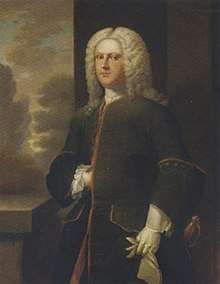Sir Cholmeley Dering, 4th Baronet
Sir Cholmeley Dering, 4th Baronet (23 June 1679 – 9 May 1711) was an English Tory politician who sat in the English and British House of Commons from 1705 to 1711. He was killed in a duel after a fight at dinner.

Early life
Dering was the eldest son of Sir Edward Dering, 3rd Baronet of Surrenden in Pluckley, Kent by Elizabeth Cholmeley, daughter of Sir William Cholmeley, 2nd Baronet of Whitby, Yorkshire. Cholmeley Dering was ten years old when he succeeded his father as baronet in 1689. On 17 July 1704 he married Mary Fisher, only child of Edward Fisher, merchant of Mitcham, and of his wife Ellen Norton, daughter of Richard Norton [1]
Career
Dering was elected at the top of the poll as Tory MP for Kent at the 1705 English general election. He voted against the Court candidate for Speaker on 25 October 1705. At the 1708 British general election, he was defeated at Kent. However he was returned as MP for Saltash at a by-election on 7 December 1708. In the following year, he was arrested at a tavern near the Royal Exchange together with three political colleagues who would later become members of the hard-drinking Tory club, the Band of Brothers. In 1710, he followed the party line, voting against the impeachment of Dr Sacheverell. At the 1710 British general election he was elected for both Saltash and Kent, and chose to sit for Kent.[2]
Death and legacy
Dering was dining with others at an inn near Hampton Court on 7 May 1711 when he became involved in an argument with Richard Thornhill. They came to blows and in the ensuing struggle Dering kicked out several of Thornhill's teeth. Their companions broke up the fight, but Thornhill afterwards sent Dering a note challenging him to a duel at Tothill Fields in Westminster on the morning of the 9 May. The duel was with pistols, both being fired but only Dering was hit and he died soon after. Thornhill was tried for murder but convicted of the lesser offence of manslaughter, in light of the original provocation.[3]
The incident is recorded by Jonathan Swift in his Journal to Stella[4] and was alluded to by Richard Steele in The Spectator.[5] Thornhill was murdered on Turnham Green on 20 August the same year, by two men who allegedly invoked Dering's name as they killed him.[6]
Dering's wife, Mary, died in 1707 aged only 20, perhaps as a result of the birth of their younger son Cholmeley.[7] Dering and his wife had at least two children:
- Sir Edward Dering, 5th Baronet who succeeded to the baronetcy
- Cholmeley Dering
See also
- List of famous duels
References
- Cokayne, George Edward, ed. (1902), Complete Baronetage volume 2 (1625-1649), 2, Exeter: William Pollard and Co, retrieved 9 October 2018
- "Saltash". History of Parliament. Retrieved 6 March 2016.
- Burke, Peter. (1849). Celebrated Trials connected with the Aristocracy. London: William Benning & Co. (The use of April rather than May throughout the account seems to be an error.)
- Swift, Jonathan. Journal to Stella; Journal to Stella – Letter 22
- The Spectator Number 84. (6 June 1771)
- Swift, Journal to Stella
- Haslewood, Rev. Francis. (1876). Genealogical Memoranda of the Family of Dering. London.
| Parliament of England | ||
|---|---|---|
| Preceded by Sir Thomas Hales Sir Francis Leigh |
Member of Parliament for Kent 1705–1707 With: Viscount Villiers |
Succeeded by Parliament of Great Britain |
| Parliament of Great Britain | ||
| Preceded by Parliament of England |
Member of Parliament for Kent 1707–1708 With: Viscount Villiers |
Succeeded by Sir Thomas Palmer Sir Stephen Lennard |
| Preceded by James Buller Alexander Pendarves |
Member of Parliament for Saltash 1708–1710 With: Alexander Pendarves |
Succeeded by Alexander Pendarves Jonathan Elford |
| Preceded by Sir Thomas Palmer, Bt David Polhill |
Member of Parliament for Kent 1710–1711 With: Percival Hart |
Succeeded by Percival Hart Sir William Hardres |
| Baronetage of England | ||
| Preceded by Edward Dering |
Baronet (of Surrenden Dering) 1689–1711 |
Succeeded by Edward Dering |